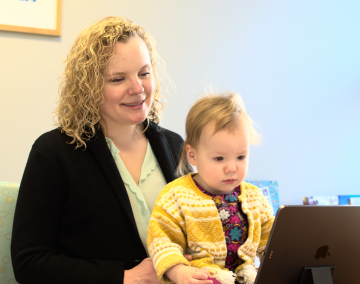Innovation to Promote Early Childhood Service Access and Well-Being
November 1, 2022

All Babies and Children Thrive (ABC Thrive), an initiative of Bass Connections, has awarded follow-on grants to two interdisciplinary teams addressing barriers to services and supporting well-being for young children.
SenseToKnow for Caregivers: A Digital Caregiver Coaching App and Race, Gesture, Learning and Teaching Effectiveness were among four teams awarded seed grants up to $40,000 to pilot their projects in 2020. Both teams will now receive larger, follow-on grants to continue their work over the next two years.
SenseToKnow for Caregivers: A Digital Caregiver Coaching App

Faculty leaders: Lauren Franz, Psychiatry & Behavioral Sciences, School of Medicine (Primary Investigator); Geraldine Dawson, Psychiatry & Behavioral Sciences, School of Medicine; Matias Di Martino, Electrical & Computer Engineering, Pratt School of Engineering; Guillermo Sapiro, Electrical & Computer Engineering, Pratt School of Engineering
Faculty/staff contributors: Richard Chung, Departments of Pediatrics and Medicine, School of Medicine; Steven Espinosa, Duke Office of Information Technology
Community input: Autism Society of North Carolina; Duke Center for Autism and Brain Development; Duke Pediatric Primary Care; Duke Center for Autism Community Engagement Advisory Board consisting of autistic adults, parents, community educators, policy leaders, healthcare providers and business leaders
This project aims to help caregivers of young autistic children gain access to timely services and support. Through their original ABC Thrive seed grant, this team conducted focus groups and interviews with a diverse group of caregivers, pediatricians, early intervention providers and autistic adults in order to determine the needs and priorities of various stakeholders. Using this broad set of qualitative data as well as empirically based best practices for caregiver-delivered early interventions, they designed a digital wireframe of a caregiver coaching app.
With this follow-on grant, they plan to integrate digital autism caregiver coaching into their screening and outcome monitoring tool, the SenseToKnow (S2K) app. The app will provide information about best practices for early intervention and allow caregivers to track the child’s developmental progress. The team will then assess the usability and impact of the app on child social engagement and early language abilities through a pilot mixed-methods study with diverse caregiver-child pairs.
Leveraging the medical and technological expertise of its team leaders and the resources of the Duke Center for Autism and Brain Development, this project is poised to provide needed support at scale to autistic children and their caregivers.
Race, Gesture, Learning and Teaching Effectiveness

Faculty leaders: Leslie Babinski, Center for Child & Family Policy, Sanford School of Public Policy; Sarah Gaither, Psychology & Neuroscience, Trinity College of Arts & Sciences; Anna Gassman-Pines, Sanford School of Public Policy; Makeba Wilbourn, Psychology & Neuroscience, Trinity College of Arts & Sciences
Community partners: Durham Public Schools, Empower Dance Studio, Johnston County Public Schools, KidZu, Museum of Life and Science, The Duke School, White Rock Child Development Center
Over the past two years, this project team has been examining how race and nonverbal communication, such as gesture and affect, impact children’s learning. Through a set of in-lab studies that measured learning outcomes in response to a series of instructional videos, the team generated strong pilot data suggesting gestures may not only improve children’s memory for new information but also function as a “cultural bridge” between teachers and students of different races.
Through this follow-on grant, the team will work to replicate their research in the lab and pilot a gesture intervention in first and second grade classrooms in local elementary schools. They hypothesize that children of all races will have better recall of vocabulary when their teachers use gestures in their instruction.
By combining extensive interdisciplinary expertise in racial identity development, cognitive and language development, educational psychology, and public policy with deep-rooted community partnerships, this team hopes to develop and share more equitable teaching models.
About ABC Thrive
ABC Thrive takes a holistic approach to helping babies and young children get the best possible start in life, focusing on their physical, mental and emotional well-being, as well as their environment and community. Leveraging the innovative research, education, clinical care and outreach capabilities of Duke University and Duke Health, the initiative promotes optimal development in children from prenatal to age five. Priority areas include prenatal and early childhood health and wellness, community outreach and applied technology to achieve scale.
ABC Thrive is affiliated with Bass Connections and housed in the Office of Interdisciplinary Studies. It was established by a generous gift from Duke alumna and trustee Laurene Meir Sperling and her husband, Scott M. Sperling, through the Sperling Family Charitable Foundation. ABC Thrive is directed by Katie Rosanbalm, Senior Research Scientist at the Duke Center for Child and Family Policy.
Learn More
- Read about previous ABC Thrive seed grantees and our first follow-on grantee.
- Read the Bass Connections 2021-2022 Annual Report.
- See more opportunities for faculty to participate in Bass Connections.
